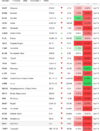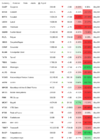bigdog
Retired many years ago
- Joined
- 19 July 2006
- Posts
- 8,218
- Reactions
- 5,661
Russia Stock Market Index MOEX CFD - Quote - Chart - Historical Data - News
The main stock market index in Russia (MOEX) increased 181 points or 5.84% since the beginning of 2024, according to trading on a contract for difference (CFD) that tracks this benchmark index from Russia. Russia Stock Market Index MOEX CFD - values, historical data, forecasts and news - updated...
The MOEX Russia Index closed 1.1% down at 2,317 on Tuesday, amid concerns over the Russian economy and the prospect of additional western sanctions.
Central Bank of Russia Governor Elvira Nabiullina warned Monday that the Russian economy “will enter a period of structural transformation” in the 2nd and 3rd quarters, interpreted as signals of harsh economic contraction.
Also, EU Commission President Ursula von der Leyen said over the weekend that the EU could soon impose its sixth package of sanctions to target Russia’s banking and energy sectors.
Financial stocks led the losses in Moscow, with Sberbank falling 2.9% and VTB ending 1.7% lower.
Meanwhile, Tatneft shares dropped 3.5% as it was one of the first Russian firms to begin the process of delisting their depository receipts from foreign bourses.
The move came after the central bank announced firms had to complete the delisting by May 5th, following the decree signed by President Putin to limit foreign control on Russian firms.


